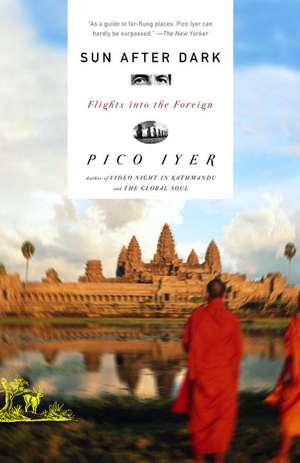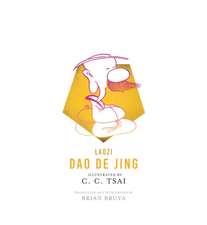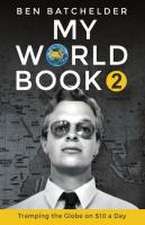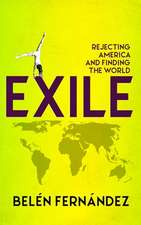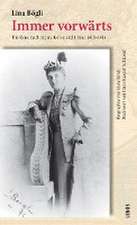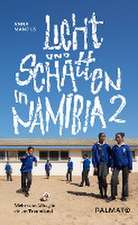Sun After Dark: Flights Into the Foreign: Vintage Departures
Autor Pico Iyeren Limba Engleză Paperback – 31 mar 2005
But the true subject of Sun After Dark is the dislocations of the mind in transit. And so Iyer takes us along to meditate with Leonard Cohen and talk geopolitics with the Dalai Lama. He navigates the Magritte-like landscape of jet lag, “a place that no human had ever been until forty or so years ago.” And on every page of this poetic and provocative book, he compels us to redraw our map of the world.
| Toate formatele și edițiile | Preț | Express |
|---|---|---|
| Paperback (2) | 70.00 lei 6-8 săpt. | |
| Vintage Publishing – 31 mar 2005 | 107.46 lei 3-5 săpt. | |
| Bloomsbury Publishing – 16 ian 2005 | 70.00 lei 6-8 săpt. |
Din seria Vintage Departures
-
 Preț: 108.09 lei
Preț: 108.09 lei -
 Preț: 108.91 lei
Preț: 108.91 lei -
 Preț: 109.73 lei
Preț: 109.73 lei -
 Preț: 90.64 lei
Preț: 90.64 lei -
 Preț: 103.53 lei
Preț: 103.53 lei -
 Preț: 99.60 lei
Preț: 99.60 lei -
 Preț: 109.95 lei
Preț: 109.95 lei -
 Preț: 107.46 lei
Preț: 107.46 lei -
 Preț: 104.58 lei
Preț: 104.58 lei -
 Preț: 121.63 lei
Preț: 121.63 lei -
 Preț: 95.10 lei
Preț: 95.10 lei -
 Preț: 117.69 lei
Preț: 117.69 lei -
 Preț: 107.05 lei
Preț: 107.05 lei -
 Preț: 138.12 lei
Preț: 138.12 lei -
 Preț: 91.27 lei
Preț: 91.27 lei -
 Preț: 136.59 lei
Preț: 136.59 lei -
 Preț: 108.50 lei
Preț: 108.50 lei -
 Preț: 128.33 lei
Preț: 128.33 lei -
 Preț: 104.58 lei
Preț: 104.58 lei -
 Preț: 109.54 lei
Preț: 109.54 lei -
 Preț: 108.50 lei
Preț: 108.50 lei -
 Preț: 94.10 lei
Preț: 94.10 lei -
 Preț: 109.95 lei
Preț: 109.95 lei -
 Preț: 75.68 lei
Preț: 75.68 lei -
 Preț: 100.23 lei
Preț: 100.23 lei -
 Preț: 105.54 lei
Preț: 105.54 lei -
 Preț: 106.76 lei
Preț: 106.76 lei -
 Preț: 91.13 lei
Preț: 91.13 lei -
 Preț: 119.23 lei
Preț: 119.23 lei -
 Preț: 90.72 lei
Preț: 90.72 lei -
 Preț: 111.71 lei
Preț: 111.71 lei -
 Preț: 92.01 lei
Preț: 92.01 lei -
 Preț: 105.29 lei
Preț: 105.29 lei -
 Preț: 132.88 lei
Preț: 132.88 lei -
 Preț: 88.68 lei
Preț: 88.68 lei -
 Preț: 118.51 lei
Preț: 118.51 lei -
 Preț: 114.79 lei
Preț: 114.79 lei -
 Preț: 118.51 lei
Preț: 118.51 lei -
 Preț: 110.28 lei
Preț: 110.28 lei -
 Preț: 114.79 lei
Preț: 114.79 lei -
 Preț: 99.82 lei
Preț: 99.82 lei -
 Preț: 104.56 lei
Preț: 104.56 lei -
 Preț: 99.41 lei
Preț: 99.41 lei -
 Preț: 105.29 lei
Preț: 105.29 lei -
 Preț: 121.28 lei
Preț: 121.28 lei -
 Preț: 88.66 lei
Preț: 88.66 lei -
 Preț: 125.54 lei
Preț: 125.54 lei -
 Preț: 114.38 lei
Preț: 114.38 lei -
 Preț: 101.17 lei
Preț: 101.17 lei
Preț: 107.46 lei
Nou
Puncte Express: 161
Preț estimativ în valută:
20.56€ • 21.99$ • 17.14£
20.56€ • 21.99$ • 17.14£
Carte disponibilă
Livrare economică 27 martie-10 aprilie
Preluare comenzi: 021 569.72.76
Specificații
ISBN-13: 9781400031030
ISBN-10: 1400031036
Pagini: 240
Dimensiuni: 133 x 205 x 16 mm
Greutate: 0.25 kg
Editura: Vintage Publishing
Seria Vintage Departures
ISBN-10: 1400031036
Pagini: 240
Dimensiuni: 133 x 205 x 16 mm
Greutate: 0.25 kg
Editura: Vintage Publishing
Seria Vintage Departures
Notă biografică
Pico Iyer is the author of several books about cultures converging, including Video Night in Kathmandu, The Lady and the Monk, The Global Soul, and, most recently, Abandon. His articles appear often in such magazines as Harper’s, Time, and the New York Review of Books. He lives in suburban Japan.
Extras
THE PLACE ACROSS THE MOUNTAINS
One midsummer evening in La Paz, just before New Year's Eve, I went out into the dark to find a taxi to take me to the modern suburbs. I hadn't slept--or not slept--for many days, it seemed, and so, not quite myself, I hailed a cab and told the driver to take me to a Mexican restaurant I had read about, down in the warm valley to the south. We followed the curves of a mountain road, and came very soon to a darkened grid of long, straight streets, stretching in every direction. I repeated the address of the place to the driver, but Indian names are hard to make out for a foreigner, and soon, very soon, we were lost.
Security guards watched us from their posts, outside the villas of the rich; every last detail seemed picked out in the lunar quiet. Up above, in the commotion of the Indian area, everything was a swarm of color; here the streets were laid out as precisely as if with a ruler and pencil. We turned one way, turned another, and on every side were faced with long, straight streets, concluding, in one place only, at the mountain. I began to worry that we'd never find our way out of the dark maze.
I paid the driver and got out, shivering in the midsummer chill, and began to walk down one street, then another. But there was nothing to be found. Only the guards, standing stock-still outside their shuttered gates; the parked cars and small trees and sleeping houses. At the end of one little road, a sharp slab of mountain, bone white and cold in the dark. I could have been back in California (or in the mock-Californian suburb where I live now in Japan).
I went on walking down the street--its straight lines, its precise edges made to insist on its distance from Bolivia--and as I did, following this path, and then that one, the rock face before me silver under the full moon, suddenly I had an eerie premonition: I'd been in this unremarkable place before. I knew its shape, the feel of it; I knew just how the streets would run, silent and straight, and then end up at the mountain.
And then, as I continued, I realized that I really had been here before: half a lifetime before--more--at the age of eighteen. I'd been traveling around South America with a schoolfriend, and at some point we had landed up in just this place. An unexceptional grid of streets that did everything they could to announce their closeness to the future.
I'd been drawn, at the time, to everything that lay outside my cozy, rectilinear neighborhood in California, and I'd come back from South America impressed by what might make an impression on any teenager: the golden, palmy beaches of Brazil; the high silence of the Altiplano, nothing but llamas and rounded hills with snow on them, a cold lake in the distance; the excited girls at the Hotel Picasso in Bogotá whom, in our innocence, we'd taken to be innocent travelers like ourselves. When I'd returned home, I'd brought back a whole carousel of slides, visible and invisible, from my adventure. And unexceptional suburban streets in La Paz had not been among them.
A quarter of a century later, though, sitting at my desk in Japan, suddenly I'd been visited, piercingly, by images of Bolivia. Its high, denim skies; the Indian women laboring up the narrow, high-walled streets past the cathedral towards the heavens; the haunted statues of Tiahuanaco, looking out on an emptiness so absolute it might have been the same a thousand years before. For some reason, I felt I had to go back there, to a place that had hardly made an impression on me, so I'd thought, when I was young.
I gathered my things and came back, at a time when all the world was suddenly talking and thinking of war, and what I found, in the dark, was an eighteen-year-old boy, with long hair down to his shoulders, in a blue-and-yellow poncho, at the end of a grueling three-month trip. It had been a weekday afternoon, I now remembered, and the two of us had followed a suggestion in The South America Handbook to come out to visit the new church in the suburbs. It had been a long drive from downtown--passengers had got in and got out--and by the end we were the only ones left inside the bus.
When we'd got out, we'd found that everything was closed this silent Tuesday afternoon. The church was shuttered: just the outline of the Savior striding across its roof. Around it, a new posh suburb was clearly coming up: long straight streets, and on one side, the edge of the mountains. Rob, by the end of the week, would be taking off alone, to Brasília, the Iguazú Falls; I would be in a fisherman's hut in the dark, near the mouth of the Amazon. We'd arrived, in all senses, at the end of the line.
The moment had meant next to nothing, especially in the midst of all the drama that had come before, and after, and it was almost exactly what I might never have expected to find, here on this midsummer night twenty-seven years later. And yet I could picture it all now: not so much the church as the feeling, of desolation, the air of stillness and unsettledness, the sense of a place yet to be filled in and peopled in this bright modern suburb on a silent afternoon. Straight streets in every direction, and at one edge, the mountainside.
I went back a few days later--New Year's Eve now--to see what the area looked like in broad daylight, and I found that the suburb was ablaze with karaoke parlors and restaurants. The church, in the middle of a quiet suburb, was not even mentioned in the guidebooks now. Girls in French dresses, boys in designer sunglasses were gathered outside a streetside juice stand, looking to while away a long afternoon. An Indian dwarf played a pair of panpipes at their feet, his hat extended in front of him for stray coins. The dance of rich and poor that was one of the things that had brought me here.
And yet, at the edge of the frame, another figure, more private, with long hair, looking out not at the modern grid of streets but at everything that encircled them.
*****
The great blessing of his upbringing, Albert Camus writes in the soaring preface to his Lyrical and Critical Essays, was that he was born "halfway between poverty and the sun." The daily difficulty of life in his native Algeria meant that he was never very far from the lessons of infirmity and suffering that the Buddha, for one, had to leave his gilded palace to encounter; and yet the sun, the bright horizons, meant that something else was always imminent. Those two forces, hardship and possibility, became in some sense Camus's earliest playmates, which he took with him even to the curtained salons of Paris. "I feel humility," he goes on to say in the same preface, "in my heart of hearts, only in the presence of the poorest lives and the greatest adventures of the mind. Between the two is a society I find ludicrous."
What he was saying, among other things, is that he was a traveler for life, a "stranger"--to use the word forever associated with him--wherever he happened to find himself, able to bring the news from the place across the mountains to Paris, to Algiers, to everywhere. Explorations of the poorest lives became one of the great adventures of his mind. And in the process, like more and more who came after him, he threw into question what was central, what the margins, and saw how the two circle around one another like fascinated strangers, each haunted by the Other.
This is, I think, part of the impulse that moves many a traveler--the chance to confront the questions and challenges that he would never see at home. "True and serious traveling," as the great explorer and exile who never really left home, Thoreau, wrote, "is no pastime, but is as serious as the grave." These days, when we can be anywhere tomorrow (those of us in the privileged world, at least), such words can sound foolishly portentous and quaint; and yet these days, when the whole world is accessible to us, we are still finding new ways to test ourselves against Everest or Antarctica. Travel remains a journey into whatever we can't explain, or explain away.
We travel, we all know, every time we dream (or, better yet, return from a dream with a few haunted pieces we know we'll never be able to put together again); we travel when we fall, with Thomas Pynchon, into the eleven days that got lost when Wednesday, September 2, 1752, overnight as it were, became Thursday, September 14, as the Julian calendar in Britain and her colonies became the Gregorian; we travel when someone tells us the story of her life. The physical aspect of travel is, for me, the least interesting; what really draws me is the prospect of stepping out of the daylight of everything I know, into the shadows of what I don't know, and may never know. Confronted by the foreign, we grow newly attentive to the details of the world, even as we make out, sometimes, the larger outline that lies behind them. "The music of the world," as Camus, lost in Prague, observes, "finds its way more easily into this heart grown less secure. Finally stripped bare, the slightest solitary tree becomes the most tender and fragile of images."
I know in my own case that a trip has really been successful if I come back sounding strange even to myself; if, in some sense, I never come back at all, but remain up at night unsettled by what I've seen. I bring back receipts, postcards, the jottings I have made, but none of them really tells the story of what I've encountered; that remains somewhere between what I can't say and what I can't know. The smell of daphne in the little lanes of Japan in the autumn; the sound of chanting, chattering from a distant church. The red robes laid out in the sun to dry, on the whitewashed walls of a monastery, that fill me with a sudden, unanswerable sensation that I've been to this place before. We travel, some of us, to slip through the curtain of the ordinary, and into the presence of whatever lies just outside our apprehension.
A temple bell sounds from across the Mekong River. A longboat drifts towards the distant shore. Children splash and laugh in the water at the foot of the steps, and, along the narrow dusty path behind us, a monk in orange robes looks down. The sun is bright, but filtered through the trees. For just a moment, for no reason I can decipher, I am in a place I know better than I should; I fall through the gratings of the conscious mind, and into a place that observes a different kind of logic.
These hauntings make up the invisible story of our lives, the shadow side of the resume, if you like. When we sleep, as we do for perhaps a third of our days, we see not the places we know so well so much as somewhere we might have visited once, magically rearranged. Even when we're lying sleepless in our beds, trying to will ourselves into the dark, what we meet, often, are not the people who surround us every day, but a stranger, perhaps, whose eyes met ours in a cafe in Reykjavik twenty years ago. Something unresolved. I like the word "flights" because it can refer as much to a piano concerto as to the movements of a bird, and it reminds us that "flights of fancy" take us as far from what we know as any flights in fact.
We travel most, I mean to say, when we stumble, and we stumble most when we come to a place of poverty and need (like Haiti, perhaps, or Cambodia); and what we find in such confounding places, often, is that it is the sadness that makes the sunshine more involving or, as often, that it is the spirit and optimism of the place that make the difficulties more haunting. "The ideal travel book," Christopher Isherwood once wrote, "should be perhaps a little like a crime story, in which you're in search of something." And it's the best kind of something, I would add, if it's something you never find.
A few years ago, when America was enjoying a period of prosperity unprecedented in its history--and computers were being hailed as the unacknowledged legislators of mankind (at a time when two-thirds of the people alive had never used a telephone)--I decided to take myself off to the poorest countries in various corners of the world: to Cambodia and Laos in Asia, to Yemen in Arabia, to Haiti and Bolivia in the Americas, and to Ethiopia, Easter Island, Tibet. I didn't think that these places were more important than California; but nor was I ready to believe that they were less so. And for someone living in California, they seemed a useful corrective to what I might otherwise assume to be real life, and a way to raise questions about what poverty really means and whether tomorrow is actually wiser than last night.
The beauty of any flight, after all, is that, as soon as we leave the ground, we leave a sense of who we are behind. The four walls that marked and enclosed our lives this morning grow smaller and still smaller, less and less distinct, till finally they disappear altogether in the grid of houses all around. We rise and rise through the clouds, into a blue stillness, and the very "we" and "I" that seemed so urgent when we awoke become as remote, as hard to take seriously, as that house far, far below, now invisible.
*****
The particular blessing of the modern moment, for me, is that such flights are more and more accessible, even to those who never travel. The Other is everywhere today, not least on our front doorsteps. We step outside our houses and are surrounded by the colors and rites of the place across the mountains. Ghosts and talismans and ancient superstitions are all around us; look outside your window, and you may see a dead chicken placed ceremonially at the center of a crossroads. A foreign mumbling is coming through the walls, from the new neighbor, and the signs on the store down the street dance and swirl as in a suq in North Africa. The modern, shifting world has brought disorientation home to us, and mystery and strangeness; even in the most familiar places we may come upon something unsettling, just through the alien presence at our side (I go into a church in Florence, everyday as the morning to me, and the friend I've brought with me from Japan suddenly stiffens, and runs out, her heart assaulted by the strangeness of a place I would never think twice about).
This flooding of the foreign into our living rooms--our bedrooms--is not always conducive to a sense of calm; all the spirits we like to keep locked up--suspicion, defensiveness, fear--suddenly rear their heads. A stranger is always at our door, nowadays, with an offer, an inquiry, and we don't know what to make of him. The Other brings alien rhythms, smells, and spices to the neighborhood, and we're in the dark even when the room is brightly lit.
From the Hardcover edition.
One midsummer evening in La Paz, just before New Year's Eve, I went out into the dark to find a taxi to take me to the modern suburbs. I hadn't slept--or not slept--for many days, it seemed, and so, not quite myself, I hailed a cab and told the driver to take me to a Mexican restaurant I had read about, down in the warm valley to the south. We followed the curves of a mountain road, and came very soon to a darkened grid of long, straight streets, stretching in every direction. I repeated the address of the place to the driver, but Indian names are hard to make out for a foreigner, and soon, very soon, we were lost.
Security guards watched us from their posts, outside the villas of the rich; every last detail seemed picked out in the lunar quiet. Up above, in the commotion of the Indian area, everything was a swarm of color; here the streets were laid out as precisely as if with a ruler and pencil. We turned one way, turned another, and on every side were faced with long, straight streets, concluding, in one place only, at the mountain. I began to worry that we'd never find our way out of the dark maze.
I paid the driver and got out, shivering in the midsummer chill, and began to walk down one street, then another. But there was nothing to be found. Only the guards, standing stock-still outside their shuttered gates; the parked cars and small trees and sleeping houses. At the end of one little road, a sharp slab of mountain, bone white and cold in the dark. I could have been back in California (or in the mock-Californian suburb where I live now in Japan).
I went on walking down the street--its straight lines, its precise edges made to insist on its distance from Bolivia--and as I did, following this path, and then that one, the rock face before me silver under the full moon, suddenly I had an eerie premonition: I'd been in this unremarkable place before. I knew its shape, the feel of it; I knew just how the streets would run, silent and straight, and then end up at the mountain.
And then, as I continued, I realized that I really had been here before: half a lifetime before--more--at the age of eighteen. I'd been traveling around South America with a schoolfriend, and at some point we had landed up in just this place. An unexceptional grid of streets that did everything they could to announce their closeness to the future.
I'd been drawn, at the time, to everything that lay outside my cozy, rectilinear neighborhood in California, and I'd come back from South America impressed by what might make an impression on any teenager: the golden, palmy beaches of Brazil; the high silence of the Altiplano, nothing but llamas and rounded hills with snow on them, a cold lake in the distance; the excited girls at the Hotel Picasso in Bogotá whom, in our innocence, we'd taken to be innocent travelers like ourselves. When I'd returned home, I'd brought back a whole carousel of slides, visible and invisible, from my adventure. And unexceptional suburban streets in La Paz had not been among them.
A quarter of a century later, though, sitting at my desk in Japan, suddenly I'd been visited, piercingly, by images of Bolivia. Its high, denim skies; the Indian women laboring up the narrow, high-walled streets past the cathedral towards the heavens; the haunted statues of Tiahuanaco, looking out on an emptiness so absolute it might have been the same a thousand years before. For some reason, I felt I had to go back there, to a place that had hardly made an impression on me, so I'd thought, when I was young.
I gathered my things and came back, at a time when all the world was suddenly talking and thinking of war, and what I found, in the dark, was an eighteen-year-old boy, with long hair down to his shoulders, in a blue-and-yellow poncho, at the end of a grueling three-month trip. It had been a weekday afternoon, I now remembered, and the two of us had followed a suggestion in The South America Handbook to come out to visit the new church in the suburbs. It had been a long drive from downtown--passengers had got in and got out--and by the end we were the only ones left inside the bus.
When we'd got out, we'd found that everything was closed this silent Tuesday afternoon. The church was shuttered: just the outline of the Savior striding across its roof. Around it, a new posh suburb was clearly coming up: long straight streets, and on one side, the edge of the mountains. Rob, by the end of the week, would be taking off alone, to Brasília, the Iguazú Falls; I would be in a fisherman's hut in the dark, near the mouth of the Amazon. We'd arrived, in all senses, at the end of the line.
The moment had meant next to nothing, especially in the midst of all the drama that had come before, and after, and it was almost exactly what I might never have expected to find, here on this midsummer night twenty-seven years later. And yet I could picture it all now: not so much the church as the feeling, of desolation, the air of stillness and unsettledness, the sense of a place yet to be filled in and peopled in this bright modern suburb on a silent afternoon. Straight streets in every direction, and at one edge, the mountainside.
I went back a few days later--New Year's Eve now--to see what the area looked like in broad daylight, and I found that the suburb was ablaze with karaoke parlors and restaurants. The church, in the middle of a quiet suburb, was not even mentioned in the guidebooks now. Girls in French dresses, boys in designer sunglasses were gathered outside a streetside juice stand, looking to while away a long afternoon. An Indian dwarf played a pair of panpipes at their feet, his hat extended in front of him for stray coins. The dance of rich and poor that was one of the things that had brought me here.
And yet, at the edge of the frame, another figure, more private, with long hair, looking out not at the modern grid of streets but at everything that encircled them.
*****
The great blessing of his upbringing, Albert Camus writes in the soaring preface to his Lyrical and Critical Essays, was that he was born "halfway between poverty and the sun." The daily difficulty of life in his native Algeria meant that he was never very far from the lessons of infirmity and suffering that the Buddha, for one, had to leave his gilded palace to encounter; and yet the sun, the bright horizons, meant that something else was always imminent. Those two forces, hardship and possibility, became in some sense Camus's earliest playmates, which he took with him even to the curtained salons of Paris. "I feel humility," he goes on to say in the same preface, "in my heart of hearts, only in the presence of the poorest lives and the greatest adventures of the mind. Between the two is a society I find ludicrous."
What he was saying, among other things, is that he was a traveler for life, a "stranger"--to use the word forever associated with him--wherever he happened to find himself, able to bring the news from the place across the mountains to Paris, to Algiers, to everywhere. Explorations of the poorest lives became one of the great adventures of his mind. And in the process, like more and more who came after him, he threw into question what was central, what the margins, and saw how the two circle around one another like fascinated strangers, each haunted by the Other.
This is, I think, part of the impulse that moves many a traveler--the chance to confront the questions and challenges that he would never see at home. "True and serious traveling," as the great explorer and exile who never really left home, Thoreau, wrote, "is no pastime, but is as serious as the grave." These days, when we can be anywhere tomorrow (those of us in the privileged world, at least), such words can sound foolishly portentous and quaint; and yet these days, when the whole world is accessible to us, we are still finding new ways to test ourselves against Everest or Antarctica. Travel remains a journey into whatever we can't explain, or explain away.
We travel, we all know, every time we dream (or, better yet, return from a dream with a few haunted pieces we know we'll never be able to put together again); we travel when we fall, with Thomas Pynchon, into the eleven days that got lost when Wednesday, September 2, 1752, overnight as it were, became Thursday, September 14, as the Julian calendar in Britain and her colonies became the Gregorian; we travel when someone tells us the story of her life. The physical aspect of travel is, for me, the least interesting; what really draws me is the prospect of stepping out of the daylight of everything I know, into the shadows of what I don't know, and may never know. Confronted by the foreign, we grow newly attentive to the details of the world, even as we make out, sometimes, the larger outline that lies behind them. "The music of the world," as Camus, lost in Prague, observes, "finds its way more easily into this heart grown less secure. Finally stripped bare, the slightest solitary tree becomes the most tender and fragile of images."
I know in my own case that a trip has really been successful if I come back sounding strange even to myself; if, in some sense, I never come back at all, but remain up at night unsettled by what I've seen. I bring back receipts, postcards, the jottings I have made, but none of them really tells the story of what I've encountered; that remains somewhere between what I can't say and what I can't know. The smell of daphne in the little lanes of Japan in the autumn; the sound of chanting, chattering from a distant church. The red robes laid out in the sun to dry, on the whitewashed walls of a monastery, that fill me with a sudden, unanswerable sensation that I've been to this place before. We travel, some of us, to slip through the curtain of the ordinary, and into the presence of whatever lies just outside our apprehension.
A temple bell sounds from across the Mekong River. A longboat drifts towards the distant shore. Children splash and laugh in the water at the foot of the steps, and, along the narrow dusty path behind us, a monk in orange robes looks down. The sun is bright, but filtered through the trees. For just a moment, for no reason I can decipher, I am in a place I know better than I should; I fall through the gratings of the conscious mind, and into a place that observes a different kind of logic.
These hauntings make up the invisible story of our lives, the shadow side of the resume, if you like. When we sleep, as we do for perhaps a third of our days, we see not the places we know so well so much as somewhere we might have visited once, magically rearranged. Even when we're lying sleepless in our beds, trying to will ourselves into the dark, what we meet, often, are not the people who surround us every day, but a stranger, perhaps, whose eyes met ours in a cafe in Reykjavik twenty years ago. Something unresolved. I like the word "flights" because it can refer as much to a piano concerto as to the movements of a bird, and it reminds us that "flights of fancy" take us as far from what we know as any flights in fact.
We travel most, I mean to say, when we stumble, and we stumble most when we come to a place of poverty and need (like Haiti, perhaps, or Cambodia); and what we find in such confounding places, often, is that it is the sadness that makes the sunshine more involving or, as often, that it is the spirit and optimism of the place that make the difficulties more haunting. "The ideal travel book," Christopher Isherwood once wrote, "should be perhaps a little like a crime story, in which you're in search of something." And it's the best kind of something, I would add, if it's something you never find.
A few years ago, when America was enjoying a period of prosperity unprecedented in its history--and computers were being hailed as the unacknowledged legislators of mankind (at a time when two-thirds of the people alive had never used a telephone)--I decided to take myself off to the poorest countries in various corners of the world: to Cambodia and Laos in Asia, to Yemen in Arabia, to Haiti and Bolivia in the Americas, and to Ethiopia, Easter Island, Tibet. I didn't think that these places were more important than California; but nor was I ready to believe that they were less so. And for someone living in California, they seemed a useful corrective to what I might otherwise assume to be real life, and a way to raise questions about what poverty really means and whether tomorrow is actually wiser than last night.
The beauty of any flight, after all, is that, as soon as we leave the ground, we leave a sense of who we are behind. The four walls that marked and enclosed our lives this morning grow smaller and still smaller, less and less distinct, till finally they disappear altogether in the grid of houses all around. We rise and rise through the clouds, into a blue stillness, and the very "we" and "I" that seemed so urgent when we awoke become as remote, as hard to take seriously, as that house far, far below, now invisible.
*****
The particular blessing of the modern moment, for me, is that such flights are more and more accessible, even to those who never travel. The Other is everywhere today, not least on our front doorsteps. We step outside our houses and are surrounded by the colors and rites of the place across the mountains. Ghosts and talismans and ancient superstitions are all around us; look outside your window, and you may see a dead chicken placed ceremonially at the center of a crossroads. A foreign mumbling is coming through the walls, from the new neighbor, and the signs on the store down the street dance and swirl as in a suq in North Africa. The modern, shifting world has brought disorientation home to us, and mystery and strangeness; even in the most familiar places we may come upon something unsettling, just through the alien presence at our side (I go into a church in Florence, everyday as the morning to me, and the friend I've brought with me from Japan suddenly stiffens, and runs out, her heart assaulted by the strangeness of a place I would never think twice about).
This flooding of the foreign into our living rooms--our bedrooms--is not always conducive to a sense of calm; all the spirits we like to keep locked up--suspicion, defensiveness, fear--suddenly rear their heads. A stranger is always at our door, nowadays, with an offer, an inquiry, and we don't know what to make of him. The Other brings alien rhythms, smells, and spices to the neighborhood, and we're in the dark even when the room is brightly lit.
From the Hardcover edition.
Recenzii
“As a guide to far-flung places, Pico Iyer can hardly be surpassed.” –The New Yorker
“If Iyer is only a travel writer, then so was Henry James.” –Los Angeles Times
“Iyer brings . . . startling freshness to his accounts of travel. . . . Ranks as one of Iyer's best books.” –The Seattle Times
“Pico Iyer’s remarkable talent is enough justification for going anywhere in the world he fancies.” –Washington Post Book World
“Brilliant . . . [Iyer] reflects back at us images from a post-colonial world that is gorgeously complex and stubbornly elusive, yet firmly within his grasp.” –New York Times
"Pico Iyer is among the finest travel writers of his generation." –Time
“Iyer travels to places that many of us have never been to, and may never go to. . . . Iyer writes beautifully, and I was happy to follow wherever his wanderings (physical and spiritual) led.” –San Francisco Chronicle
“Pico Iyer is a writer like no other, sui generis, and in this book his particular gifts of thoughtfulness, perception and descriptive power, allied by now with profound experience, reach new levels of grace.” –Jan Morris
“Jan Morris has retired; Graham Greene is dead. Pico Iyer is on his way to replacing them... Leave your guidebook behind. Go follow Iyer.” –National Geographic Adventure
“Iyer is an exceptional travel writer, who not only limns Peruvian street maps with clarity and wit, but also offers a compelling rationale for immersing yourself in a foreign environment.” –Gotham
“Iyer is a master of the ironic detail, and in these pieces he is able to notice the very objects whose juxtaposition will nail shut the lid of his beautifully constructed metaphorical box. . . . Goes where most of us will not go and returns with the dire details.” –Kirkus Reviews
“Hallucinatory and observant, this little book confirms Iyer as one of the most gifted wanderers writing today.” –Seattle Weekly
“Mr. Iyer writes with remarkable grace. . . . He is not only wonderful company but will take you on journeys–of place, heart and spirit–you perhaps had not dared imagine.” –Santa Barbara News-Press
“The world’s best travel writer.” –The Oregonian
“If Iyer is only a travel writer, then so was Henry James.” –Los Angeles Times
“Iyer brings . . . startling freshness to his accounts of travel. . . . Ranks as one of Iyer's best books.” –The Seattle Times
“Pico Iyer’s remarkable talent is enough justification for going anywhere in the world he fancies.” –Washington Post Book World
“Brilliant . . . [Iyer] reflects back at us images from a post-colonial world that is gorgeously complex and stubbornly elusive, yet firmly within his grasp.” –New York Times
"Pico Iyer is among the finest travel writers of his generation." –Time
“Iyer travels to places that many of us have never been to, and may never go to. . . . Iyer writes beautifully, and I was happy to follow wherever his wanderings (physical and spiritual) led.” –San Francisco Chronicle
“Pico Iyer is a writer like no other, sui generis, and in this book his particular gifts of thoughtfulness, perception and descriptive power, allied by now with profound experience, reach new levels of grace.” –Jan Morris
“Jan Morris has retired; Graham Greene is dead. Pico Iyer is on his way to replacing them... Leave your guidebook behind. Go follow Iyer.” –National Geographic Adventure
“Iyer is an exceptional travel writer, who not only limns Peruvian street maps with clarity and wit, but also offers a compelling rationale for immersing yourself in a foreign environment.” –Gotham
“Iyer is a master of the ironic detail, and in these pieces he is able to notice the very objects whose juxtaposition will nail shut the lid of his beautifully constructed metaphorical box. . . . Goes where most of us will not go and returns with the dire details.” –Kirkus Reviews
“Hallucinatory and observant, this little book confirms Iyer as one of the most gifted wanderers writing today.” –Seattle Weekly
“Mr. Iyer writes with remarkable grace. . . . He is not only wonderful company but will take you on journeys–of place, heart and spirit–you perhaps had not dared imagine.” –Santa Barbara News-Press
“The world’s best travel writer.” –The Oregonian
Descriere
Descriere de la o altă ediție sau format:
A stunning new collection of travel writing from the brilliantly compelling and provocative author of Video Night in Kathmandu.
A stunning new collection of travel writing from the brilliantly compelling and provocative author of Video Night in Kathmandu.
